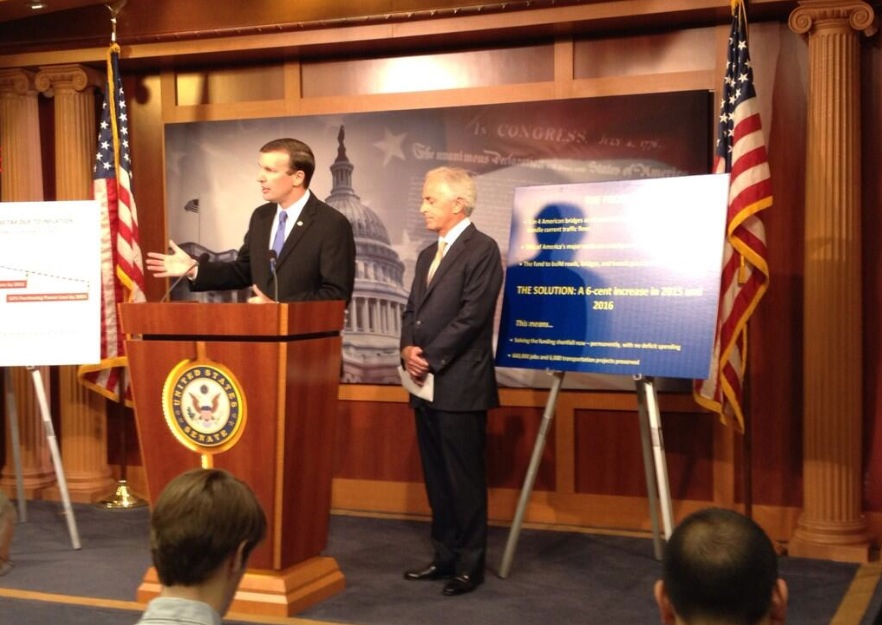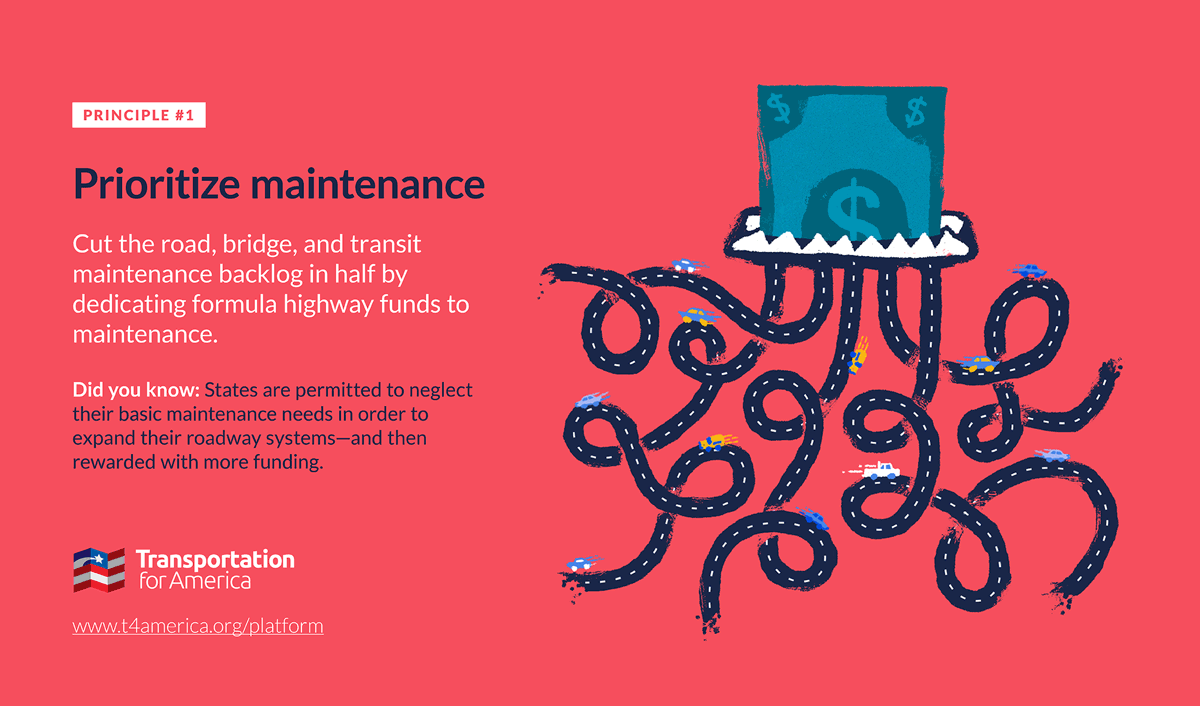Senators unveil bipartisan plan to rescue the federal transportation program by raising the gas tax
Senators Chris Murphy (D-CT) and Bob Corker (R-TN) today announced their bipartisan plan to raise the nation’s gas tax by 12 cents over two years to rescue the nation’s Highway Trust Fund, which is headed for insolvency before the end of the summer.

Senators Murphy and Corker introduce their proposal to raise the gas tax by 12 cents and index it to inflation on Wednesday, June 18, 2014. Photo courtesy of Sen. Murphy’s office.
Unveiled at an event at the U.S. Capitol this morning, The Highway Funding and Tax Reduction Proposal would increase the federal gasoline and diesel taxes by 6 cents in each of the next two years for a total of a 12-cent increase. The taxes would then be indexed to inflation, so that transportation funding keeps in step with construction costs. (The federal gas tax has lost about a third of its purchasing power since it was last raised in1993.)
These two simple changes would provide funding to sustain current spending levels, plus inflation, over the next 10 years. The Murphy-Corker plan proposes to offset some of the increased costs to individuals by permanently extending a handful of tax breaks that benefit ordinary households.
Since 2008, Congress has transferred more than $50 billion in general funds into the Highway Trust Fund to maintain investment levels, and the fund’s spending is currently projected to outpace revenues by over $160 billion in the next decade. Just to have enough money to continue the program for next year would require finding an additional $18 billion before Oct. 1.
But now, for the first time in this Congress, a legitimate, bipartisan plan has been offered to solve the shortfall of the nation’s transportation trust fund. No temporary patches, no swapping funding between programs, no general fund transfer or accounting sleight-of-hand.
“Proposed short-term patches using accounting gimmicks have been all but shot down in both houses,” said T4America Director James Corless in our full statement released this morning. “Senators Murphy and Corker are showing real leadership – as well as concern for their constituents’ jobs and safety – by championing a long-term solution that recognizes the gravity of the situation and addresses it head-on. … The alternative is to allow our transportation system to crumble along with an economy hobbled by crapshoot commutes and clogged freight corridors.”
“By modestly raising the federal gas tax, we can address a crippling economic liability for this country—the inability to finance long-term improvements to our crumbling national infrastructure,” said Senator Murphy in the Senators’ joint statement this morning.
“I know raising the gas tax isn’t an easy choice, but we’re not elected to make easy decisions – we’re elected to make the hard ones. This modest increase will pay dividends in the long run and I encourage my colleagues to get behind this bipartisan proposal,” he said.
Senator Bob Corker, who certainly understands how important transportation investments are down at the local level as the former mayor of Chattanooga, TN, stated emphatically at the event that “if something is important enough to have, it’s important enough to pay for.”
“Congress should be embarrassed that it has played chicken with the Highway Trust Fund and allowed it to become one of the largest budgeting failures in the federal government,” he added in his official statement. “If Americans feel that having modern roads and bridges is important then Congress should have the courage to pay for it.”
As our recent post on support for gas tax increases at the state level shows, voters may be more accepting of higher transportation taxes than conventional wisdom suggests. And any move to stave off crisis and stabilize the federal program for the long term brings cheers from the local officials who represent home-state constituents.
“We certainly support Senator Murphy’s efforts to put our transportation trust fund on a sound footing,” said Lyle Wray, executive director of the Capitol Region (Hartford) Council of Governments in Murphy’s state of Connecticut. “We have seen two bridge closures in just the last two weeks on the Metro-North line, the busiest commuter line in the country. Repairing and replacing bridges is just the start of our communities’ needs. We have been doing all we can to stretch dollars and use debt financing, but we have gone as far as we can go without additional funding. Raising the gas tax is the best solution we see for stable funding for critical infrastructure in the near term.”
And in Franklin, TN, a southern suburb of Nashville, Mayor Ken Moore offered Sen. Corker — a prior mayor of Chattanooga — his support for the proposal.
As mayor of Franklin and chair of the mayors’ caucus of Middle Tennessee, I can say we have been supportive of raising the gas tax because we recognize this is what funds our highways and our transit, and we can’t allow our infrastructure to deteriorate. We have to stabilize the trust fund and provide consistent funding.
Middle Tennessee is the economic generator now for Tennessee, one of the fastest growing regions in terms of creating jobs. While that is a good problem, it creates a burden on our infrastructure. It’s important to make sure we have the certainty of funding so we can continue to support this economic development
As a mayor I can see the handwriting on the wall. Without this we will be tremendously challenged to avoid congestion and gridlock. The number one calls and emails I get are about traffic and congestion. I think voters will support it if they know it will go towards relief and supporting that economic growth.
So there you have it. The first legitimate, bipartisan transportation revenue proposal is on the table. Senators Murphy and Corker deserve great credit for their leadership and courage to propose a real fix to the transportation funding crisis.
We will have more on this proposal as we track its progress closely over the next few weeks and months, so stay tuned.



















